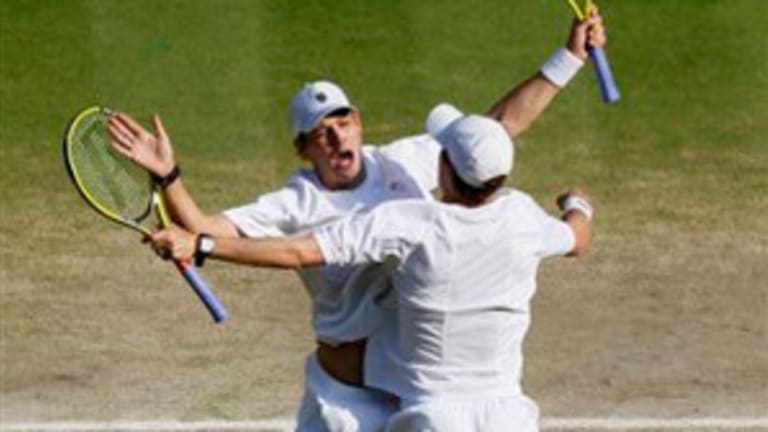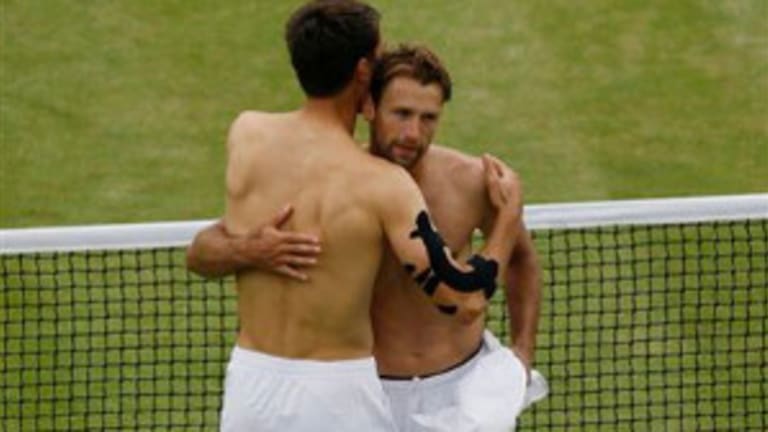Not everything went through the looking glass at Wimbledon this year. The Bryan brothers continued to live their golden years in style, by completing what they termed a "Golden Bryan Slam"—they now hold all of the major titles, as well as the Olympic gold. Watching them cut off shots at net and move in perfect hyper tandem after all these years, you really do feel like they're going to be doing this—i.e., winning—until they're 40. I don't think I've seen them jump quite as high for a chest bump as they did after this Wimbledon win. A+
Sabine Lisicki
Maybe it makes sense that someone who plays better at Wimbledon than anywhere else would be a fan favorite here. Lisicki finally showed what her big game can do, even with its maddening inconsistencies, and she was at her best when her back was against the wall. She said in her post-final presser that while she had to beat Serena and Radwanska, Bartoli had a much easier ride to the final, and that gave her an advantage. That’s the luck of the draw, but staying healthy, playing better everywhere else, and improving her ranking would help get Lisicki better draws in the future. If she can give the moribund but once powerful German tennis industry a shake, her success will be good for tennis. A
Novak Djokovic
The world No. 1, who hasn’t won a major other than the Australian Open since 2011, isn’t a dominant champion these days. He’s lost three of his last four Slam finals, and two of three to Murray. More troublingly, this may have been his worst performance in any of his 10 major finals. Djokovic looked sharp through the quarters and showed heart in beating Juan Martin del Potro in a classic semi, but he let himself get agitated and distracted by line calls in the final. Obviously disappointed, he was terse afterward, though he also said it was a great tournament overall. And it was—for anyone but him. On Sunday, I thought Djokovic felt the weight of the crowd, who weren’t afraid to boo him when he argued. More generally, he has struggled to relax and let his game flow in his biggest matches, and he’s won just two titles since the Aussie Open. Novak used to bend but not break. He’s been breaking more often lately. A-
Juan Martin del Potro
Those of us who have watched him closely over the years knew that Del Potro, while he could look sleepy and shambling, was a subtle showman. Against Djokovic in the semis, he brought his act to the British masses and helped give us the most well-loved match of 2013 so far. At times, Delpo seemed to be in exhibition mode, but it only helped him stay loose, play better, and hang in longer. Just as important, he recorded a win over David Ferrer, who had rolled him here a year ago, and brought back the super-sonic forehand of his pre-surgery days. One them went 120 M.P.H. He’s back, again. A-
Agnieszka Radwanska
Time management is part of winning a Grand Slam; you want to win as efficiently as you can to save your energy for the later rounds. Aga, by her own admission, didn’t do that this year. She dropped sets to Madison Keys, Tsvetana Pironkova, and Li Na, and she said she felt all of those miles at the end of her semifinal with Lisicki. Still, Radwanska helped give us the match of the women’s tournament in that semi. But it wasn’t enough. Hopefully being that close will give her more belief that the majors aren’t out of reach for her.
It’s unfortunate, as I wrote in my review of the match, that all the things Aga did well that day were overshadowed by the one thing she didn’t do so well: Shake Lisicki’s hand. It happens: This isn’t the first time Radwanska has offered her opponent the drive-by treatment, and the handshake Lisicki gave her fellow German Angelique Kerber here last year was on the icy side as well. As anyone who was in her press conference afterward could attest, Aga took this loss hard— “I didn’t feel like that,” she said, meaning she didn’t feel like sharing a moment with Sabine at the net. Radwanska was two points from the Wimbledon final, and she lost to a player who has always been lower than her on the WTA totem pole.
I don’t need to see hugs or even smiles after defeats that painful, but I want to see some minimal sign of respect or acknowledgment pass between the two competitors. Radwanska didn’t give Lisicki that. As an Aga fan, though, I’ll remember how she played the rest of the day, and forgive her her disappointment that it all went for naught. A-
Jerzy Janowicz
Breakout runs by stars-in-the-making have been rare in tennis in recent years, but Janowicz’s semifinal appearance at Wimbledon qualifies. He made a big impression on a lot of people who had never seen him before. The 22-year-old was eventually broken down by Murray in the semis, but not before he showed how well someone 6’8” can move, and the kind of exciting, attacking tennis he can play. Plus, if you want some edge back in tennis, you’ll find a buzzsaw’s worth with him. Just don’t ask Jerzy how how high he can climb. Here’s an exchange from his post-semi press conference:
Q: How good do you think you can be in the next few years?
Janowicz: Honestly? I hate these kind of questions. A-
Kirsten Flipkens
Her variety is a pleasure to watch. Even better was her reaction to her quarterfinal win over Petra Kvitova—pure joy and disbelief. Then she got a beat down. A-
Sloane Stephens
The positives: She backed up her Aussie semifinal with a Wimbledon quarterfinal. She upped her Grand Slam record to 12-3 this year. She can say the words “I’m playing well” again. She’s only 20. And she showed that she can beat rank-and-file opponents without her best. The negative: She was without her best a lot. B+
Bernard Tomic
He said, loudly, that he wanted his father with him on the grounds, but he didn’t pester Wimbledon too much to make it happen. His father’s enforced absence appeared to help Bernie in a couple of ways: On the one hand, he could fight the powers that be, a favorite pastime of his on and off the court; on the other, he didn’t have to look up and see his father staring at him during the matches. The combination worked, until he ran into a player, Tomas Berdych, who was a cut above. Now Tomic is back where he was two years ago, when he reached the quarterfinals here. Let’s hope the next two seasons are more productive. B+
Lukasz Kubot

